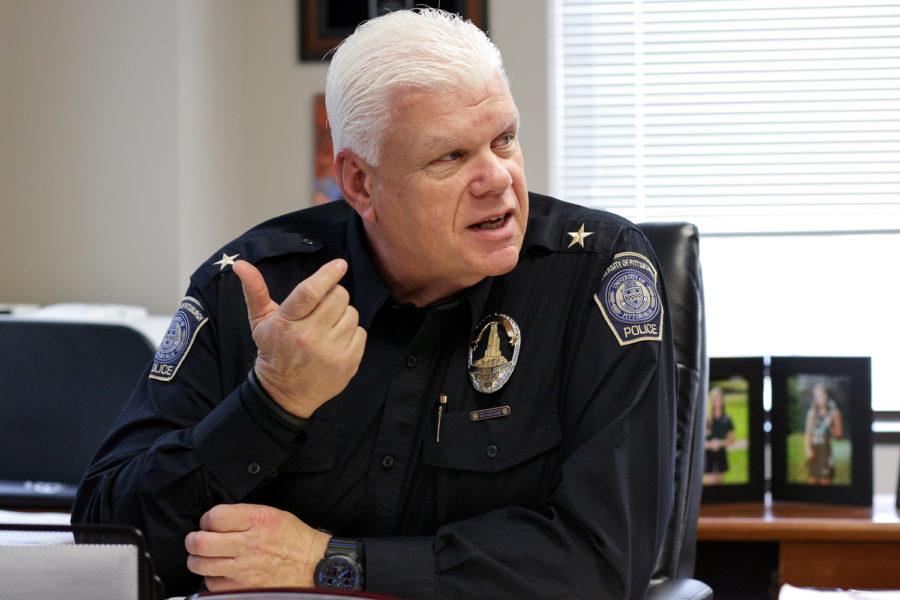‘A very scary situation’: Student react to active shooter hoax, cite need for better communication
Pitt police chief James Loftus.
April 5, 2023
When Pitt’s campus locked down for a supposed active shooter threat at a nearby high school last Wednesday, it took a long time for Tia Sanjeev to find out that the report was a hoax, especially as false information circulated on social media.
“When the lockdown occurred, I genuinely thought that there was a real threat due to the heavy presence of police and SWAT teams,” Sanjeev, a first-year molecular biology major, said. “Even though it was a hoax, there was no way of knowing at the time, so it was a very scary situation. I’m just glad that no one got hurt.”
Sanjeev said she was relieved when they announced that there was no real threat.
“That’s honestly what I’m most grateful for,” Sanjeev said. “I like to look at the silver lining and I’m just happy that nothing happened.”
Following the aftermath of last Wednesday’s lockdown, students expressed safety concerns and called for better communication from the University.
Early in the morning last Wednesday, City and Pitt police responded to reports of a potential active shooter at Central Catholic High School in Oakland. Pitt sent multiple Emergency Notification Service messages to students, faculty and staff, warning them about a “critical incident” at Central Catholic and telling them to avoid the area. Campus eventually went on lockdown for about half an hour. The final alert reopened campus, saying the incident was “unfounded.”
Pittsburgh Public Safety found no evidence of an active shooter at Central Catholic High School. Ted Fritz, vice chancellor for public safety and emergency management, said in a campuswide email that the incident was “part of a malicious hoax involving false reports of active shooters being made to multiple schools across the region.”
Although the potential threats at Central and Oakland Catholic were hoaxes, Sanjeev said mixed information and confusion about how to respond to the lockdown caused a lot of panic.
“The lack of communication from Pitt was honestly really scary,” Sanjeev said. “We had no idea about anything that was going on. I had no idea whether some of my classes would be canceled or not.”
In an online statement, Pitt’s Office of Public Safety and Emergency Management said it sent some ENS alerts for the Central Catholic incident through opt-in methods, instead of through email, which all Pitt affiliates are signed up to receive.
“Some ENS alerts for the Central Catholic incident were not sent via email earlier today and only sent via text, voice and social media,” the statement read. “All University members are automatically subscribed to receive ENS messages by email. You are strongly encouraged to sign up for optional text and phone messages as well.”
Bob Chamberlain, Pitt’s emergency coordinator, previously said Pitt police will also send ENS messages through the Rave Guardian app and through official social media accounts.
James Loftus, the chief of Pitt police, said in February following the shooting at Michigan State University that communicating with students comes secondary to containing and stopping the shooter.
“Our first priority is to deal with the threat,” Loftus said. “We will get the ENS out, but the communications will be secondary to that, but they will be coming as frequently and as comprehensively as possible.”
Kate Carpenter, a first-year psychology major, said she chose not to attend classes for the rest of the day in order to rest and regroup.
“It was definitely a very scary experience,” Carpenter said. “I was in Cathy when it happened and there was no communication about what was happening. Maybe canceling classes for the rest of the day would have been smart.”
The University did not cancel classes for the remainder of the day, but Dean of Students Carla Panzella encouraged students to “make the best decision for yourself today about how to take care of yourself.”
“That may mean resuming your daily routine, or it may mean taking some time to decompress,” she said.
Marina Skuban, a first-year physics and astronomy major, was in her calculus lecture in the Cathedral of Learning when she started hearing sirens in the distance.
“I started getting texts from friends who sent me screenshots saying that there were six confirmed dead at Central Catholic,” Skuban said. “My first instinct was to call my sister because she lives maybe within a block or two of the school. I left class to call her and make sure that she was safe.”
After Cathedral security told her it was safe to leave, Skuban heard from fellow students that all campus buildings were on lockdown.
“I tried to get into my dorm, which I couldn’t, and I couldn’t go back to Cathy, so my friends had to ask the people at the front desk of Hillman if I could get in,” Skuban said. “I had to show my ID at the door and eventually got inside, but was kind of stranded for a while.”
Skuban added that it was a “very emotional moment” for some of her friends who had relatives or friends that go to Central Catholic and other schools in the area.
Saturday night, just days after Wednesday’s lockdown, a series of emergency notification alarm systems sounded in residence halls across campus. Although it was a false alarm, the activation of the alarm systems increased stress for many.
“In regards to the malfunction this weekend, I was in the library during the time, so, again, I had no clue what was going on,” Skuban said. “None of my friends in the dorms knew what was going on either, so I wasn’t sure if I could go back or how long it would take to be resolved. It is just another thing that I wish the school communicated better.”
Mersades Cook, a second-year master’s student studying policy administration at Pitt’s Graduate School of Public and International Affairs, said she found out about the Wednesday threat via a group chat for Black students roughly three minutes before receiving the ENS alert from Pitt.
“I think that information about how the lockdown actually works needs to be communicated more effectively,” Cook said. “Many of the worst reactions came from professors, who were unsure of what happened and did not know whether to cancel class or not. What happens for classes that were in session during the lockdown?”
Cook chose to carry out her day as normal following the lockdown. She said she has experienced multiple active shooter protocols while growing up in Chicago.
“I have actually been in a real school shooting situation more than once in the past,” Cook said. “It’s like, down the street there is a shooting, so lock down the school. It’s not exactly rare, so you have to just say ‘life goes on.’”
But she said for her international student friends, experiencing an active shooter lockdown was much scarier.
“I spend a lot of time with my international friends, so I have to explain to them, ‘Yo, it happens, just stay calm,’” Cook said. “For many of them, it was their first time in this situation. Many were upset because they were told by professors that they must go to class when they didn’t want to, which is totally understandable.”



